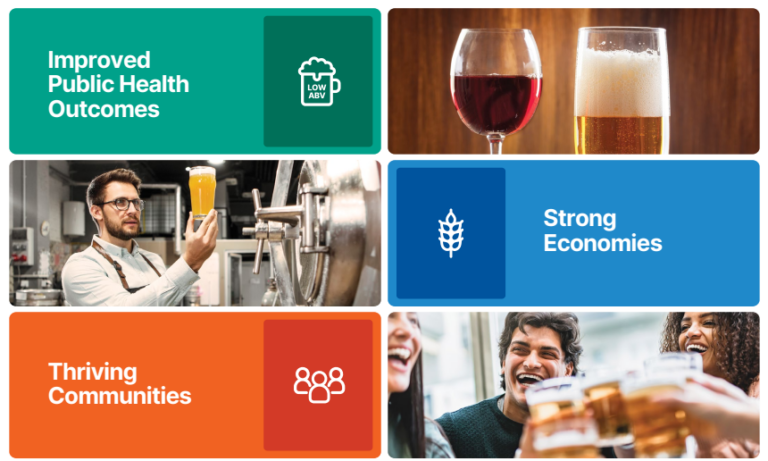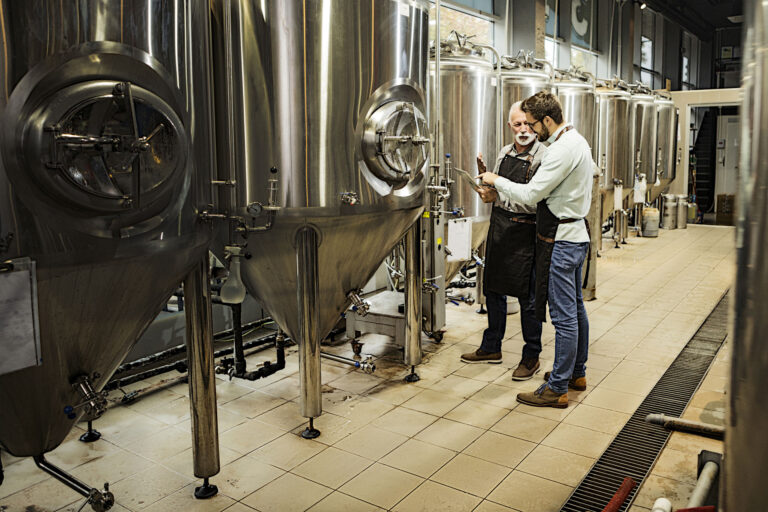- Largest ever report on the beer industry reveals benefits to economy, workforce, agriculture, and supply chains on a global scale
- The World Brewing Alliance (WBA), the global trade association representing the brewing industry, releases data on the economic impact in 185 countries
04 February 2025 – The beer industry delivered a remarkable $878 billion to the global GDP in 2023, which represented 0.8% of the global GDP, according to the latest figures revealed by the World Brewing Alliance (WBA).
The study, conducted by Oxford Economics, is the largest ever undertaken on the economic impact of the brewing industry, including figures from 185 countries, 76 in detail. The study is a global overview of the industry’s contribution across the entire journey from raw materials to cold beer, revealing a sector that supports 33 million jobs, which equates to one in every 100 jobs globally.
The expansive nature of the beer industry sees every $1M in GDP directly generated by the global brewing industry, its expenditure on inputs, wages, and the economic activity from the sale of beer, then go on to stimulate a further $8M in GDP across the global economy in 2023.
Other significant contributions to global GDP from the report include:
- Supporting Public Finances: The beer sector contributed $376B in taxes through beer production, sales, and employment in 2023.
- Local Economy: 86% of brewers’ supplier spending is in businesses in the same country as the beer is produced (global average).
- Emerging Markets: Income in low-and lower-middle income countries has seen a 27% boost in GDP contribution and a 24% increase in jobs generated by the brewing industry between 2015 and 2023.
- Jobs Supported: Globally, the beer sector now supports one in every 100 jobs (33M). Of those, just one in 52 are directly employed by brewers, highlighting the magnitude of roles in other industries.
- Agricultural Employment: Of the 33M jobs sustained, one in five agriculture jobs are supported by or associated with the global beer sector.
Justin Kissinger, World Brewing Alliance President and CEO, said, “The beer industry has a huge, positive impact on the global economy, supporting a robust value chain that includes farmers, bottlers, shippers, and the hospitality sector. What makes beer unique is that it is deeply rooted within its local markets, benefiting local economies and communities. This report shows that beer is not just one of the most enjoyed drinks around the world, but one of the most valuable industries too.”
Supply Chain, Local and Agricultural Impacts
The beer sector is continuing to have a substantial economic impact on the global economy that extends far beyond its direct value. In 2023, brewers generated $98 billion in direct GDP, but their extensive supply chains and downstream activities magnified this impact by ninefold ($878 billion). The downstream value chain alone, which includes distributors, retailers, and hospitality venues, accounted for $499 billion (57%) of the sector’s GDP impact.
A further $281 billion is supported by the brewers’ upstream operational and capital supply chains and wage-induced spending. This includes support through purchasing hops and barley from the agricultural sector, or manufacturing bottles, cans, and kegs.
As only 14% of brewers’ supplier spending is spent outside the country beer is brewed in, many local economies reap the benefits. This percentage is even higher in certain countries including Japan, Germany, and Brazil.
The productivity of those employed by brewers is significantly higher than the average worker, driving economic growth and income opportunities, particularly in developing nations. In lower-income countries, brewers generate $117,000 of GDP per worker, which is more than 18 times the average, while in high-income countries, this figure rises to $238,200. This productivity supports better-paid jobs and demonstrates the transformative power of value-added production, such as brewing beer locally from ingredients like barley and sorghum. By fostering industries that create value-added products, brewers play a critical role in boosting per capita incomes and driving sustainable economic development in emerging markets.
Agriculture plays a pivotal role too, with the overwhelming majority of agricultural products, manufacturing, and services sourced from the same country where the beer is brewed. In 2023, $10.6B was spent by brewers on raw materials alone, which contributed a total of $38B to global GDP.
In low- and lower-middle-income countries, beer’s economic impact to the national GDP was nearly double that of the global average at 1.5% (vs. 0.8). Notably, in Cambodia, the sector’s share of national GDP reached an impressive 5.8%.
The process from brewing to consumption also garners significant tax revenue on a global scale. The $376B made through taxes in 2023 is near the equivalent to the government revenues of Poland.
Jobs Supported by the Beer Sector
When breaking down the 33 million jobs supported worldwide, brewers directly employed 620,000 people and supported 11.3 million jobs along the supply chain and 21.2 million jobs through the downstream value chain, including distributors, retailers, and hospitality venues. Overall, brewing supports activities in more than 20 other industries.
Agriculture plays a huge role in the beer industry, with 6.4 million jobs tied to the sector in 2023. Farmers cultivated more than 60,000 hectares of land to grow nearly 120,000 metric tons of hops. Production for barley was significantly higher, at 57 million metric tons.
The income in low-and lower-middle income countries has seen a 27% boost in GDP contribution between 2015 and 2023, thanks to the beer industry, which has coupled with a 24% boost in employment supported in the sector.
Justin Kissinger, World Brewing Alliance CEO, continued: “Beer is local through and through. Economically, the vast majority of revenue for beer stays in the country where it’s consumed. Socially, beer is made with local ingredients and local styles and enjoyed as a part of customs and traditions all around the world. The beer industry takes our responsibility to our local communities seriously and has been working hard to reduce the harmful use of alcohol through our investments in crafting and promoting lower- and no-alcohol beer. These products give consumers more options for drinking with moderation or participating in customs with or without alcohol.”
For further country-by-country detail and sectoral breakdown of results, the WBA and Oxford Economics have launched an interactive microsite of results at https://globalbeer.oxfordeconomics.com. Here, users can explore the data at both global and individual country level and across a number of years, along with the ability to separate out the brewers and downstream value chain from the beer sector as a whole and, within that, to explore the breakdown between the direct, wage induced, and supply chain impacts.
About WBA
The World Brewing Alliance (WBA) serves as the united voice of beer, representing the brewing industry on the global stage. Our mission is to advocate for evidence-based policies that promote the shift towards lower-alcohol beverages, aiming to improve public health outcomes, strengthen economies, and support thriving communities. We are committed to sustainability, responsible marketing practices, and innovation within the brewing sector.
About Oxford Economics
Oxford Economics is the world’s foremost independent economic advisory firm. Covering over 190 countries, over 100 industrial sectors and 8,000 cities and regions, we provide insights and solutions that enable clients to make intelligent and responsible business decisions faster in an increasingly complex and uncertain world. For more information, visit https://www.oxfordeconomics.com/.
For more information, please email comms@worldbrewingalliance.org












